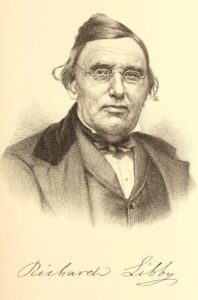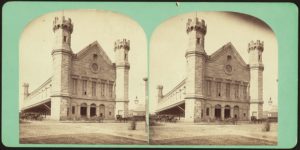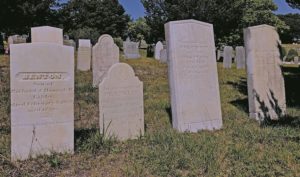Old-time New Yorkers called him “the Original Libby.” For his 90th birthday, a 1904 newspaper profile noted that he was “the pioneer dispenser of Boston imported lobsters, a master in the art of pickling oysters and adept at serving the bivalves on the half shell. He is even said to have been the man who originated the present method of opening oysters.”

Born in Hampton, Maine in 1814 but raised in Wellfleet, Demorin Libby was only nine years old when he began to work in shipping aboard coastal fishing schooners out of Wellfleet Harbor. He rose quickly in the ranks to bo’sun’s mate, captain, and eventually part owner of a fleet of schooners.
With his earnings, Libby ventured to Lower Manhattan in 1841 and established himself and his brother Richard in the restaurant business. His career there spanned more than 50 years, and his “oyster saloon” was patronized by the likes of newspaper editor and publisher Horace Greeley and business magnate Commodore Cornelius Vanderbilt.
In 1850, when Swedish soprano Jenny Lind — promoted by P.T. Barnum and dubbed the Swedish Nightingale — made her American debut at New York’s famous Castle Garden exhibition hall (previously known as Castle Clinton and later the pre-Ellis Island immigration station), newspapers noted that Demorin Libby prepared 23,000 pickled oysters for sale at the stands in the Garden.
Readers may be familiar with an interesting artifact from those days. In 1850, Jenny Lind also sang in the auditorium above the 1847 Fitchburg Railroad depot on Causeway Street in Boston. The station was slated to be razed in 1927 following a fire. But before its demolition, Boston railroad attorney Henry M. Aldrich salvaged one of the depot’s two granite towers and had the “Jenny Lind Tower” reassembled on his Truro Highlands property, where it is now a Cape Cod National Seashore eccentricity.

By Demorin Libby’s childhood, the plentiful native Wellfleet oysters that were once a self-sustaining industry had, a generation earlier, been overharvested to depletion. Reinvigorated during the early 1800s with the importation and planting of spat — tiny oyster seed — that fattened up in Wellfleet’s estuaries, the industry boomed again, thriving throughout the 19th century.
Henry David Thoreau, who first journeyed to Cape Cod in 1849, dedicates a chapter of his Cape Cod to John Young Newcomb, whom he refers to as the Wellfleet Oysterman, noting that “Nearly all the oyster shops and stands in Massachusetts, I am told, are supplied and kept by natives of Wellfleet.” One wonders if Thoreau had heard about the young man with Wellfleet roots who was earning a reputation in Manhattan culinary circles for his New England seafood specialties.
Demorin Libby, the eldest of 11 children, was the son of Capt. Richard Libby, who was born in Limington, York County, Maine in 1790 and raised in Hampden, Penobscot County. During the War of 1812, Richard Libby served as lieutenant of a letter of marque. Captured and held prisoner in Bermuda, he was later returned as part of a prisoner exchange.
In August 1813, Libby married Hannah Higgins Holbrook (1795-1859), the daughter of Capt. Jesse Holbrook (1766-1836) and Temperance Higgins (1770-1858). Both the Higgins and Holbrook families had deep roots in Cape Cod, Richard Higgins having been a pioneer settler at Eastham, from which Wellfleet was separated in 1763. The Holbrooks, writes Frederick Freeman in his Barnstable County history, have been “highly respectable in Wellfleet for a long period.”
After the birth of Demorin in Hampden, Richard and Hannah settled in Wellfleet. For nearly three decades, Capt. Libby followed the sea, later serving as postmaster, lighthouse tender, deputy collector of customs, and selectman. A prominent Mason and member of the Methodist Church, while living in Wellfleet he was twice representative to the state legislature and after moving to Boston in 1848 served as state senator from Suffolk County.
In 1859, Hannah died aboard a packet boat between Wellfleet and Boston, and Capt. Libby went to New Jersey to live with his son Oliver, who was also in the restaurant business.
When Libby died in 1876, he was brought home to Wellfleet and was buried, with Masonic honors, alongside Hannah and two of their sons in Pleasant Hill Cemetery. This was also the resting place of Hannah’s parents, Jesse and Temperance, while other Libby family members are buried in Oakdale Cemetery, adjacent to Pleasant Hill.

The peregrinations of Hannah’s father, Capt. Jesse Holbrook, highlight an interesting, though somewhat neglected, chapter of Outer Cape history: a period of the migration of families, particularly Wellfleet families, to Maine. Though Cape Cod is traditionally recognized for its seafaring heritage, farming — supplemented by onshore fishing and shellfishing — was an important way of life for many families. As the Outer Cape’s once fertile soil and plentiful woodlands were depleted by unsustainable farming practices and its once-bountiful fisheries, including the oyster beds, were also in decline from overharvesting, families looked to Maine for land ownership to reclaim their agrarian traditions.
Between 1770 and 1810, a wave of Cape Codders removed to Maine, which remained part of Massachusetts until 1820.
Born in Wellfleet to Thomas and Hannah (Harding) Holbrook, Jesse Holbrook had married Wellfleet-born Temperance Higgins in 1787. Their first two children were born in Wellfleet, after which, by 1794, the family had settled in Hampden, Maine, where their third child, daughter Hannah, was born.
A genealogical study of Capt. Jesse Holbrook, published in the Maine Genealogist, notes that over a 14-year period Holbrook was a grantor or grantee in over 20 land deeds in the Penobscot River valley and identified himself variously as a mariner, trader, yeoman, and gentleman.
Described as a strong, athletic man and a successful Wellfleet whaler in his early years, in 1801 he built the ship Hampden and was engaged by the French government to convey 300 troops to Louisiana. The ship was blockaded by an English fleet and frozen in for the winter; meanwhile, the French government sold Louisiana to the United States. The troops were ordered to disembark the Hampden, and Capt. Holbrook’s contract went unpaid. Perhaps in a weakened financial condition, within the next few years Holbrook retired to Wellfleet, where he and Temperance joined the Methodist Church. Several of their children remained in Hampden, thus continuing the Wellfleet-Maine connection.
Editor’s note: After a two-year hiatus, Wellfleet will celebrate OysterFest in person October 15-16.
Correction: A previous version of this article, published in print on Sept. 29, incorrectly identified the picture of Richard Libby as Demorin Libby’s brother, Richard. It is in fact Demorin’s father, also named Richard.



